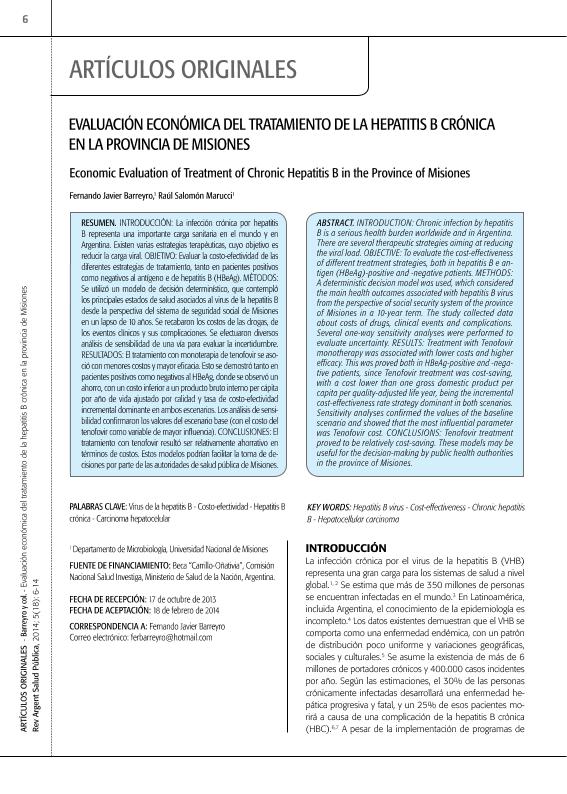Artículo
INTRODUCCIÓN: La infección crónica por hepatitis B representa una importante carga sanitaria en el mundo y en Argentina. Existen varias estrategias terapéuticas, cuyo objetivo es reducir la carga viral. OBJETIVO: Evaluar la costo-efectividad de las diferentes estrategias de tratamiento, tanto en pacientes positivos como negativos al antígeno e de hepatitis B (HBeAg). MÉTODOS: Se utilizó un modelo de decisión determinístico, que contempló los principales estados de salud asociados al virus de la hepatitis B desde la perspectiva del sistema de seguridad social de Misiones en un lapso de 10 años. Se recabaron los costos de las drogas, de los eventos clínicos y sus complicaciones. Se efectuaron diversos análisis de sensibilidad de una vía para evaluar la incertidumbre. RESULTADOS: El tratamiento con monoterapia de tenofovir se asoció con menores costos y mayor eficacia. Esto se demostró tanto en pacientes positivos como negativos al HBeAg, donde se observó un ahorro, con un costo inferior a un producto bruto interno per cápita por año de vida ajustado por calidad y tasa de costo-efectividad incremental dominante en ambos escenarios. Los análisis de sensibilidad confirmaron los valores del escenario base (con el costo del tenofovir como variable de mayor influencia). CONCLUSIONES: El tratamiento con tenofovir resultó ser relativamente ahorrativo en términos de costos. Estos modelos podrían facilitar la toma de decisiones por parte de las autoridades de salud pública de Misiones. INTRODUCTION: Chronic infection by hepatitis B is a serious health burden worldwide and in Argentina. There are several therapeutic strategies aiming at reducing the viral load. OBJECTIVE: To evaluate the cost-effectiveness of different treatment strategies, both in hepatitis B e antigen (HBeAg)-positive and -negative patients. METHODS: A deterministic decision model was used, which considered the main health outcomes associated with hepatitis B virus from the perspective of social security system of the province of Misiones in a 10-year term. The study collected data about costs of drugs, clinical events and complications. Several one-way sensitivity analyses were performed to evaluate uncertainty. RESULTS: Treatment with Tenofovir monotherapy was associated with lower costs and higher efficacy. This was proved both in HBeAg-positive and -negative patients, since Tenofovir treatment was cost-saving, with a cost lower than one gross domestic product per capita per quality-adjusted life year, being the incremental cost-effectiveness rate strategy dominant in both scenarios. Sensitivity analyses confirmed the values of the baseline scenario and showed that the most influential parameter was Tenofovir cost. CONCLUSIONS: Tenofovir treatment proved to be relatively cost-saving. These models may be useful for the decision-making by public health authorities in the province of Misiones
Evaluación económica del tratamiento de la Hepatitis B crónica en la provincia de Misiones
Título:
Economic Evaluation of Treatment of Chronic Hepatitis B in the Province of Misiones
Fecha de publicación:
03/2014
Editorial:
Presidencia de la Nación. Ministerio de Salud y Desarrollo Social
Revista:
Revista Argentina de Salud Pública
ISSN:
1853-810X
e-ISSN:
1852-8724
Idioma:
Español
Tipo de recurso:
Artículo publicado
Clasificación temática:
Resumen
Archivos asociados
Licencia
Identificadores
Colecciones
Articulos(CCT - NORDESTE)
Articulos de CTRO.CIENTIFICO TECNOL.CONICET - NORDESTE
Articulos de CTRO.CIENTIFICO TECNOL.CONICET - NORDESTE
Citación
Barreyro, Fernando Javier; Marucci, Raul Salomon; Evaluación económica del tratamiento de la Hepatitis B crónica en la provincia de Misiones; Presidencia de la Nación. Ministerio de Salud y Desarrollo Social; Revista Argentina de Salud Pública; 5; 18; 3-2014; 6-14
Compartir




